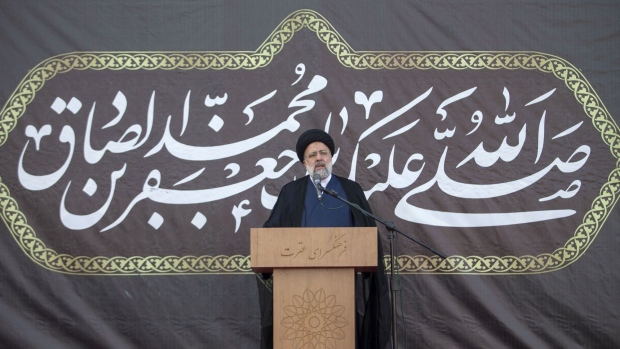Jun 17, 2021
Iran’s Gamble on Hardline President Narrows Nuclear-Deal Window
, Bloomberg News

(Bloomberg) -- The frontrunner in Friday’s presidential election in Iran is an austere cleric and judiciary chief hostile to the West, who’s expected to prevail as millions boycott a vote their favored reformist candidates weren’t allowed to contest.
The stage-managed elevation of Ebrahim Raisi, 60, carries risks for the country’s guiding hand, Supreme Leader Ali Khamenei, given the ayatollah’s desire to quickly rid Iran of U.S. sanctions and a history of political unrest. But the 82-year-old Khamenei is eyeing a sweep of leadership positions for ultraconservatives, and Raisi’s widely considered his preferred successor.
A Raisi victory would ensure a “level of harmony” among the establishment, said Foad Izadi, associate professor at Tehran University’s Faculty of World Studies, after a maximum eight years under the more moderate Hassan Rouhani punctuated by rancor.
What it might mean for those outside Iran’s power structure is less clear. Rouhani remains in office until August, giving his negotiators a few more weeks to revive the 2015 agreement with world powers that lifted penalties on Iran’s economy and curtailed its atomic program until Donald Trump withdrew the U.S.
The diplomacy is being watched by oil traders eager to understand when Iranian crude might flood the market, and Iran’s neighbors after the standoff with Trump pushed the region close to war and Tehran to enrich uranium near the level required for a bomb.
Ali Vaez, Iran project director at the International Crisis Group, foresees a grand bargain.
“The system probably prefers the deal to be restored under Rouhani, so that he shoulders the blame for any shortcomings but Raisi reaps the economic dividends,” he said. Raisi’s unlikely to make compromises the Rouhani administration couldn’t accept, so “if the nuclear deal isn’t restored by August, it’s probably beyond repair.”
Raisi’s nearest rival is Central Bank Governor Abdolnaser Hemmati, who’s backed by some prominent reformists. Saeed Jalili, another leading religious hardliner, withdrew on Wednesday.
If turnout exceeds expectations and boosts one of Raisi’s opponents, he may face a run-off. But a Monday poll found just 42% of roughly 5,000 respondents definitely planning to vote, with 60% backing the cleric.
Conscious that many dispirited Iranians are predicted to sit out the election, Raisi’s been attempting to rehabilitate his image as an out-of-touch conservative with little understanding of government.
In his campaign, he supported the nuclear-deal diplomacy but downplayed the accord as a “marginal matter.”
Raisi has touted his management of Iran’s wealthiest religious endowment, the Astan Quds Razavi, which owns land and has stakes in companies, as evidence of his business savvy.
He’s vowed to prioritize trade with Iran’s neighbors and overhaul management of the currency, echoing Khamenei’s “resistance economy” built on domestic manufacturing and supportive partners such as China and Russia.
And he wants to build one million affordable homes, increase taxes on the wealthy, and improve cash handouts for the poor cut under Rouhani as oil revenue plummeted. Conservatives tend to use populist policies to preserve support among a working-class base.
Sara Zahiri, a journalist supporting Raisi’s campaign in Tehran, said the cleric can bring together religious and more secular Iranians.
“Reformists use these differences in thinking to divide me from the woman who wears a chador,” she said, referring to the long, black cloak worn by pious women in Iran. “We want this dividing wall to be taken down.”
Officials with strong security ties from the presidency of Mahmoud Ahmadinejad could be asked to run the Oil Ministry. Candidates include Masoud Mir Kazemi, oil minister from 2009 to 2011, Abdol Hossein Bayat, ex-head of National Petrochemical Co., and Mehdi Doosti, who held a senior position at the Islamic Revolutionary Guard Corp’s construction conglomerate, according to an official not authorized to speak publicly.
If control of the portfolio shifts to a hardliner, Iran could shun deals with European majors such as Total SA, which abandoned a $5 billion project after Trump’s sanctions, and turn to Russian and Chinese developers and the Guard’s engineering firms.
Defense and foreign policy is largely decided by the Supreme National Security Council -- usually chaired by the president with its decisions approved by Khamenei -- and the military.
Born into a clerical family, Raisi entered a top seminary at 15. Five years later, and with the Islamic Republic just 12 months old, he was appointed a judge near Tehran, beginning a rise through the judiciary.
When he first ran for president in 2017, the incumbent Rouhani summed up his rival’s achievements as “38 years of executions and jailing.”
Raisi’s never publicly commented on accusations by human-rights groups that he was a presiding judge in mass executions of political prisoners in 1988. The U.S., sanctioning him in 2019, cited his role in a deadly crackdown a decade earlier on protesters alleging vote fraud.
Despite his record, Vaez at Crisis Group doesn’t see Iran reentering a period of extreme confrontation with the West under Raisi.
“If they’re seeking consolidation at home, they would need de-escalation with the outside world,” he said. And unencumbered by domestic infighting, hardliners might be more “capable of delivering on any future commitments than their pragmatic rivals.”
©2021 Bloomberg L.P.


